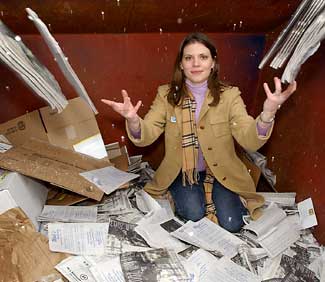Forget pounds. The U-M recycling program is measured in tons, as in the 2,100 tons of paper, 350 tons of glass metal and plastic containers and 12 tons of clothing, shoes, bedding and non-perishable food recycled in 2003. It is up to Tracy Artley, coordinator of waste and recycling, to make sure all this recycling goes off without a hitch.
“I make sure the current recycling programs are maintained and work efficiently,” she says, such as ensuring that paper recycling containers are available in all buildings.

Recycling programs at the University include paper, mixed container (which encompasses glass, metal and plastic containers), a food waste compost program in several dining halls and in the Media Union and Pierpont cafes, and the move-in and move-out programs, Artley says.
“We are currently getting ready for the large student move-out effort,” she says. “We ask students to donate unwanted materials such as bedding, clothes, loft wood and non-perishable food items, and these get donated to nonprofits.”
In addition to traditional materials, the University recycles a variety of unconventional secondary materials, including transparencies, hardcover books, floppy disks and wood pallets, Artley says.
“I would also like to institute a small electronics program that targets students,” she says. “It will provide reuse and recycling options for cell phones, pagers and those kinds of items.”
Another goal is to expand the food waste compost program to the remaining dining halls on campus.
“I want to keep all of those materials out of the trash and garbage disposals so we can make some really great compost,” she says.
Since starting as recycling coordinator five months ago, Artley—who received her bachelor of science in resource ecology and management and her master’s degree in environmental health from U-M—has been impressed with the University’s commitment to recycling.
“The greatest part about working here is how much support there is on campus for environmental initiatives,” she says. “So many people are charged up about these issues, and it gets you charged up too.”
There always is room for improvement, she says. Artley realizes faculty, staff and students have larger priorities than how they handle waste, even if they support recycling initiatives.
“I want to increase participation in the recycling programs we offer by bolstering the education that comes out of this office,” she says. “We have to make recycling easier so people can participate.”
While Artley strives to get more people to recycle, she also encourages them to reduce disposable waste by cutting out excess materials in their lives. “Recycling should be the last step and measure,” Artley says.
When she is not promoting environmentally friendly programs on campus, Artley can be found outside running or canoeing, and, when the temperatures drop, on the couch watching Godzilla movies.

